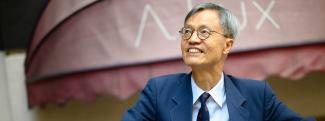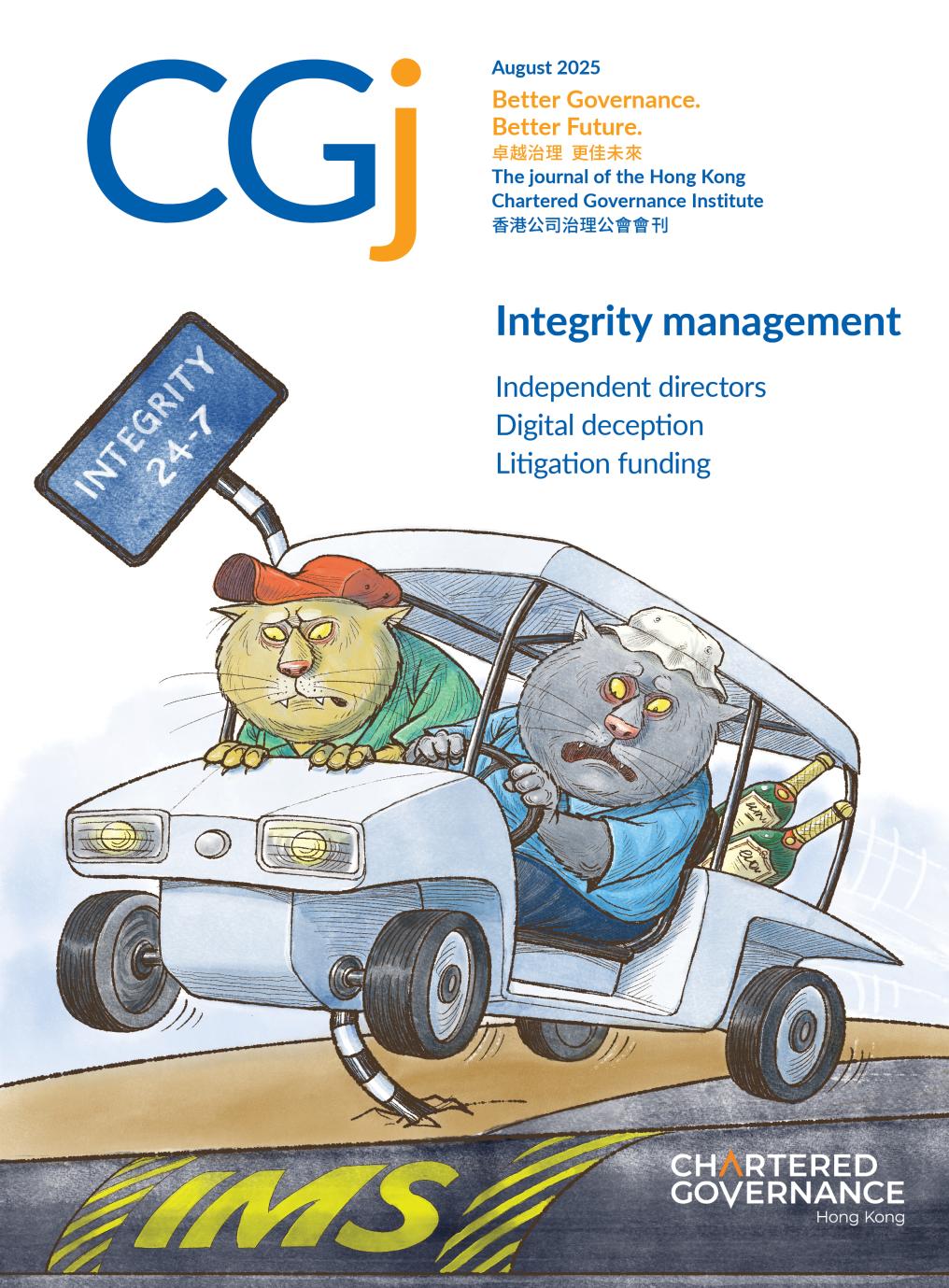This month’s interview in the GoldenGen Reflections series is with Dr Albert Lung FCG HKFCG, INED of a Hong Kong listed company.
When did you first join the Institute and what was your professional role at that time?
‘I first came into contact with the Institute in 1986. At that time, I was working in the accounts department of a large foreign-owned corporation. In such a big organisation, you’re really just a cog in the machine. The company didn’t encourage us to get involved in other departments or to gain a broader perspective on the business, such as the overall financial picture or development strategy. I heard that the Institute was hosting an information session and I decided to attend. I really wanted to understand more about business and to contribute more to society, so I enrolled in the Institute’s exams in 1987. I became an Associate in 1992 and was elected as a Fellow in 2006.
Over the years, my professional role has undergone several changes, from being an accountant to becoming an accounting manager, a finance manager and, later, the financial controller and company secretary of a listed company.’
Did membership of the Institute support your career development and, if so, in what ways?
‘It has been extremely helpful. The exams, although tough, gave me a very solid professional foundation, which in turn helped me build a more stable career path. As a member, I regularly attended seminars to keep my knowledge up to date and I also met many professionals from different disciplines. I later set up several networking groups, including both professional and academic lunch groups, which have been meeting monthly since 2004. These groups now have over 800 members, including company secretaries, accountants, lawyers and professors. These networks have not only expanded my professional connections but have also provided an excellent opportunity for exchanging ideas and growing together.’
Can you share some of your personal golden reflections of your time with the Institute?
‘What left the deepest impression on me was the first information session I attended in 1986. The Institute’s staff were incredibly proactive and dedicated to promoting professional development and the Institute’s mission. Several senior Fellows also spoke to us and shared their experiences, which truly inspired and motivated me.’
What prompted your move into teaching?
‘Membership of the Institute afforded me an internationally recognised professional qualification and, since I had spent so much time studying by then, I wanted to share that knowledge with others. As I had some free time in the evenings, I began teaching, initially accounting and management courses in 1996.
In 2016, when the Hong Kong Stock Exchange introduced new Listing Rules requirements for risk management and internal controls, I approached the School of Continuing and Professional Studies at The Chinese University of Hong Kong (CUSCS) and offered to teach these particular subjects.
I’ve always had a passion for education and a love of continuous learning. I’m currently teaching two integrated courses at CUSCS that cover all Listing Rule requirements. As a home-grown professional in Hong Kong, I also want to contribute in my own way to the city’s role as an international financial centre.’
You remain active in the Institute’s Governance Professional Mentorship Programme. Do you feel that mentorship is important?
‘I believe the mentorship system is extremely important. Many members join the Institute after passing their exams, but they may not necessarily be familiar with how the industry operates in practice. Launched in 2015 with the core aim of nurturing young professionals, the Governance Professional Mentorship Programme serves as a valuable platform for students, graduates and members to meet and share views, and to better understand potential career paths, as well as to gain valuable insights from senior Fellows.
Young members are very keen to hear our experiences, and we are equally happy to share and engage. I have always enjoyed my role as a mentor since one of my personal goals is to guide the next generation and to pass on my knowledge and experience.’
What advice would you give to the younger generation starting out in their governance careers?
‘First, the Institute is a highly respected professional body and I encourage everyone to join as soon as possible, to take the exams and to gain experience in a listed company, if feasible. Having worked in both private and listed companies, I am acutely aware of the differences in the scope and depth of work between the two. Working in a listed company allows you to engage with a wider group of stakeholders and investors, considerably broadening your perspective. You can also learn much more, enjoy a higher professional status and benefit from greater job stability.
Second, it is important to keep up with the times and maintain ambition. Corporate governance is a profession that requires continuous learning, constant updating of knowledge and diligent effort. There is an enormous amount of information to absorb, which cannot be mastered all at once. You need perseverance and the ability to pick yourself up after any setbacks in order to achieve your goals.
Last but no means least, remember that talent without integrity is dangerous and can have a severe negative impact on society. As professionals, we must uphold a strong sense of responsibility and ethics to ensure a long and successful career.’
I have always enjoyed my role as a mentor since one of my personal goals is to guide the next generation and to pass on my knowledge and experience
Dr Albert Lung FCG HKFCG
INED of a Hong Kong listed company
本期睿思智享系列访谈嘉宾为香港上市公司独立非执行董事龙卓华博士 FCG HKFCG。
您是什么时候加入公会的?当时您的专业身份是什么?
‘我第一次接触公会是在1986年。当时我在一家大型外资企业担任会计工作。在那样的大机构里,你只是一个螺丝钉,公司也不鼓励我们涉猎其他部门或更全面地了解企业,比如整个公司的财务状况或发展策略。后来我听说公会举办简介会,就决定参加。我很想多了解商业知识,也希望自己能够对社会多作贡献,于是在1987年报名参加公会考试,并于1992年成为会士,2006年获选为资深 会士。
这些年来,我的专业角色经历了几次转变,从担任会计主任,会计经理,财务经理,后来成为一家上市公司的财务总监兼公司秘书。’
公会的会员资格是否有助于您的职业发展?如果有,在哪些方面?
‘帮助非常大。考试虽然辛苦,但为我打下了非常扎实的专业基础,也让我建立起更稳定的专业路径。加入公会后,我经常参加研讨会,不断更新知识,同时结识了很多来自不同领域的专业人士。我后来建立了多个群组,包括专业和学术午餐群组,从2004年开始每月聚会一次,目前已有800多位成员,包括公司秘书、会计师、律师和教授。 这些人脉网络不仅拓展了我的专业联系,也是非常好的思想交流和共同成长的平台。’
能否分享一些您在公会期间最难忘的回忆?
‘我印象最深的是1986年参加的第一场介绍会。当时公会的职员非常积极,致力推广专业发展和公会的使命。资深会士当时也到场分享他们的经验,令我深受启发和鼓舞。’
是什么促使您投身教学工作?
‘成为公会会员让我取得国际认可的专业资格。既然花了这麽多时间钻研,我也希望能与人分享这些知识。当时我晚上有些空闲时间,1996年就开始教授会计和管理课程。
2016年,香港交易所引入了有关风险管理和内部监控的新要求,我便主动联系香港中文大学专业进修学院,提出开设相关课程。
我一直热衷教育,也喜欢不断学习。目前我在香港中文大学专业进修学院教授两门综合课程,涵盖上市规则的所有规定。作为香港土生土长的专业人士,我也希望为香港作为国际金融中心的角色出一分力。’
您一直积极参与公会的治理专业导师计划,您认为导师制度重要吗?
‘我认为导师制度非常重要。很多会员通过考试后加入公会,但未必熟悉行业的实际运作。治理专业导师计划于2015年推出,旨在培养年轻专业人士,为学生、毕业学员和会士提供宝贵的平台,让他们会面交流,了解专业发展路径,并向资深会士请益。
年轻会员都非常渴望听我们分享经验,而我们也很乐意参与其中。我一直很享受担任导师的角色,因为指导下一代、传承知识和经验,是我个人的一个目标。’
您对刚刚开始治理生涯的年轻一代有什么建议?
‘首先,公会是备受尊重的专业机构,我建议大家尽早加入、参加考试,并尽可能在上市公司汲取经验。我自己既在私人公司也在上市公司工作过,深知两者在工作深度和广度上的差异。在上市公司工作,你有机会接触不同类型的持份者和投资者,视野会宽阔得多,也能学到更多,专业地位更高,工作也相对稳定。
其次,要与时俱进,保持上进心。公司治理是一门需要不断学习的专业,要持续更新知识、勤奋努力。有太多知识需要吸收,不可能一蹴而就。你要靠毅力坚持下去,有挫折就重新站起来,才能达成目标。
最后但同样重要的是,有才而无德是很危险的,可能对社会造成严重影响。作为专业人士,我们必须具备强烈的责任感和职业道德,才能建立长期成功的事业。’
我一直很享受担任导师的角色,因为指导下一 代、传承知识和经验,是我个人的一个目标。
龙卓华博士 FCG HKFCG
香港上市公司独立非执行董事



